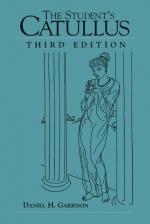|
This section contains 7,298 words (approx. 25 pages at 300 words per page) |

|
SOURCE: "Lyric and Liberty," in The Lyric Genius of Catullus, 1939. Reprint by Russell & Russell, 1967, pp. 161-84.
In the following essay, Havelock places Catullus within the context of his time, explaining the poetic tradition of which he was a part and his influence upon the Roman poetry of the classical age.
(i) the Poetae Novi and Their Significance
Though Catullus is best understood in detachment from the rest of the Latin poets, he is no isolated freak. His poetry occupies indeed a peculiar and ambiguous position, exercising a powerful influence on the young Virgil, remembered grudgingly by Horace but gratefully by the elegists, imitated by Martial, discussed by Quintilian—yet among these not one shows any signs of catching or understanding the direct inspiration of his lyrics. This fact reveals something of the fate of Latin poetry. Two things in the history of Latin literature it is difficult to...
|
This section contains 7,298 words (approx. 25 pages at 300 words per page) |

|


